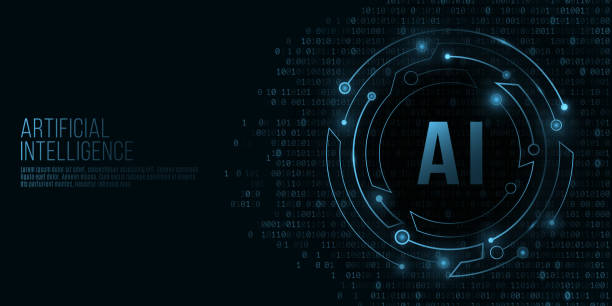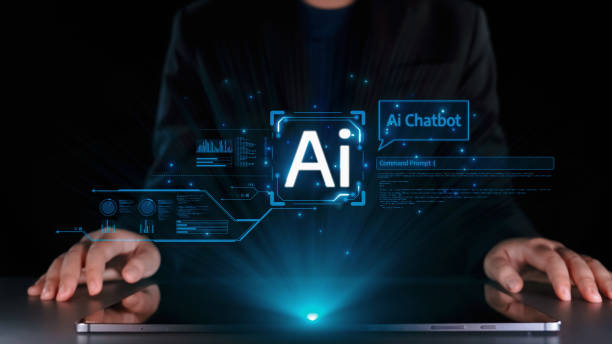What is an Artificial Intelligence Robot and How Does it Work?
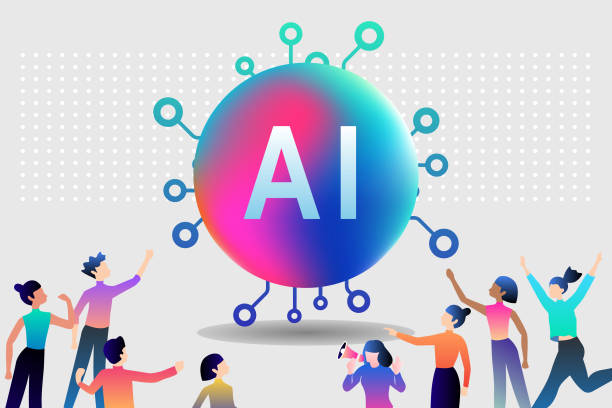
#AI Robot is a combination of two separate fields: robotics and #Artificial Intelligence (#AI).
In short, an AI robot is a machine capable of performing tasks that typically require human intelligence, such as learning, problem-solving, decision-making, and understanding natural language.
These robots use complex algorithms and machine learning models to process information, recognize patterns, and make intelligent decisions.
AI robots are essentially more advanced versions of conventional robots, which, instead of being manually programmed, can learn from their data and experiences and adapt to new conditions.
How an AI robot works usually involves the following steps:
- Receiving Information: The robot receives information from the surrounding environment through various sensors (such as cameras, microphones, touch sensors, etc.).
- Processing Information: The information collected is processed by artificial intelligence algorithms.
These algorithms can include neural networks, decision trees, and other machine learning techniques. - Decision-Making: Based on the processed information, the robot makes decisions.
These decisions can include moving, picking up objects, speaking, or performing other actions. - Execution: The robot executes its decisions using its actuators (such as motors, arms, wheels, etc.).
- Learning: The robot improves its performance using feedback received from the environment.
This learning process can be done automatically or with human assistance.
AI robots have many applications in various industries, including manufacturing, medicine, customer service, and education.
These robots can help increase productivity, reduce costs, and improve the quality of life.
Tired of losing business opportunities due to not having a professional corporate website? Worry no more! With Rasaweb’s corporate website design services:
✅ Your brand’s credibility and professionalism increase.
✅ You attract more customers and sales leads.
⚡ Get a free consultation to get started now!
Advantages of Using Artificial Intelligence Robots in Various Industries
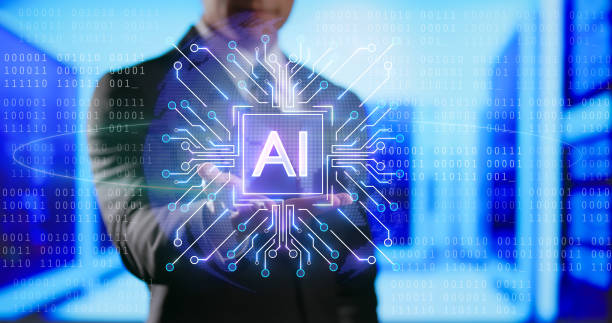
Using #AI Robots in various industries has remarkable benefits that can create massive changes in how things are done.
Here are some of these benefits:
- Increased Productivity: AI robots can work continuously and without fatigue, which leads to a significant increase in productivity in industrial environments.
These robots can perform repetitive and strenuous tasks with greater speed and accuracy than humans. - Reduced Costs: By automating processes and reducing the need for human labor, AI robots can significantly reduce operating costs.
Also, reducing errors and waste caused by human error helps to reduce costs. - Improved Quality: AI robots work with high accuracy and stability, which leads to improved product and service quality.
These robots can perform quality control processes more accurately and quickly. - Increased Safety: In hazardous environments, AI robots can replace human labor and prevent potential accidents and injuries.
These robots can perform tasks such as working at heights, working with hazardous chemicals, and working in polluted environments with greater safety. - Flexibility: AI robots can quickly adapt to changes in the environment and new needs.
These robots can improve their performance and learn new tasks using machine learning algorithms.
AI robots have many applications in industries such as manufacturing, medicine, logistics, customer service, and agriculture, and can help improve performance and increase the competitiveness of these industries.
Challenges in Developing Artificial Intelligence Robots
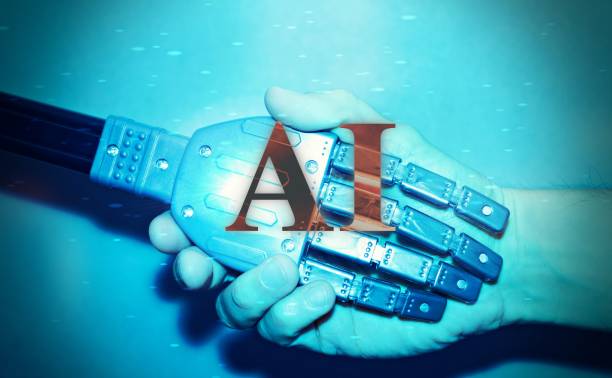
While #AI Robots have great potential to improve lives and various industries, their development and deployment come with several challenges.
These challenges can be technical, economic, social, and ethical.
- Technical Complexity: Designing and building AI robots is complex and requires expertise in various fields such as robotics, artificial intelligence, machine learning, and electronics.
Developing efficient and reliable AI algorithms is also a major challenge. - High Cost: Developing, manufacturing, and maintaining AI robots is expensive.
The high cost of sensors, processors, software, and specialized human resources can hinder the widespread use of these robots. - Ethical Issues: The use of AI robots raises several ethical issues, including their impact on employment, privacy, and security.
There are also concerns about the misuse of these robots for illegal or harmful purposes. - Legal Limitations: Laws and regulations related to AI robots are still under development and do not exist in many countries.
This issue can create ambiguities regarding the responsibilities and rights related to the use of these robots. - Public Acceptance: Public acceptance of AI robots may face resistance, especially if people are concerned about losing their jobs or the misuse of this technology.
Educating and informing the public about the benefits and applications of AI robots can help increase public acceptance.
| Challenge | Description |
|---|---|
| Technical Complexity | Requires expertise in robotics, artificial intelligence, and machine learning |
| High Cost | Cost of developing, manufacturing, and maintaining robots |
| Ethical Issues | Concerns about employment, privacy, and security |
| Legal Limitations | Lack of comprehensive laws and regulations |
| Public Acceptance | Potential resistance from the public |
Despite these challenges, many efforts are underway to overcome them, and it is expected that with technological advancements and the development of appropriate laws and regulations, the use of AI robots will expand in the future.
Applications of Artificial Intelligence Robots in Medicine and Healthcare
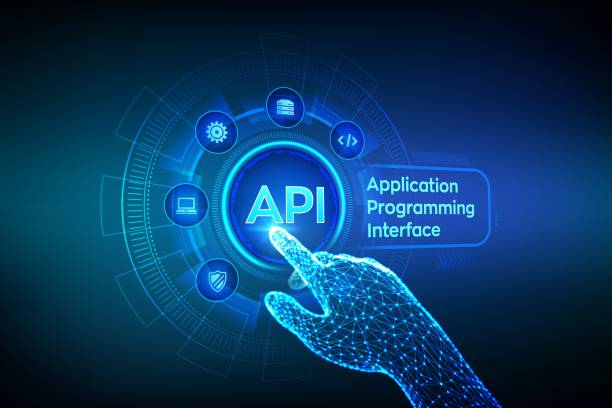
#AI Robots play an important role in transforming the medical and healthcare industry.
These robots, using artificial intelligence capabilities, can assist doctors and nurses in diagnosing, treating, and caring for patients.
Some of the applications of AI robots in medicine and healthcare include:
- Surgery: Surgical robots can perform surgeries with greater precision and skill than human surgeons.
These robots can make smaller incisions, reduce bleeding, and speed up recovery time. - Disease Diagnosis: AI robots can help doctors diagnose diseases by analyzing medical images (such as radiology and MRI) and patient data.
These robots can identify hidden patterns in the data and provide more accurate diagnoses. - Drug Delivery: Robots can deliver the medications needed by patients at the right time and with the exact dosage.
These robots can reduce medication errors and ensure that patients receive their medications on time. - Care for the Elderly and Disabled: Robots can assist the elderly and disabled in performing daily tasks, such as eating, dressing, and moving.
These robots can improve the independence and quality of life of these individuals. - Support for Nurses: Robots can perform repetitive and strenuous tasks for nurses, such as measuring patients’ vital signs, transporting laboratory samples, and cleaning medical equipment.
This allows nurses to dedicate more time to direct patient care.
AI robots in medicine and healthcare have great potential to improve the quality of patient care and reduce treatment costs.
With the advancement of technology and the development of artificial intelligence algorithms, it is expected that the applications of these robots will expand in the future.
Tired of losing customers due to a poorly designed online store? With Rasaweb, solve this problem forever!
✅ Significantly increased sales and visitor-to-customer conversion rate
✅ Smooth and engaging user experience for your customers⚡ Get a free consultation
The Future of Artificial Intelligence Robots and Their Impact on Our Lives
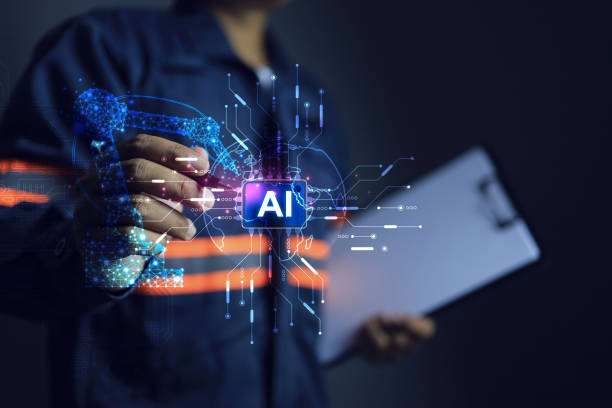
The future of #AI Robots is very bright and full of potential.
With the rapid advancement of technology and the development of artificial intelligence algorithms, it is expected that these robots will play a more important role in our lives and have a profound impact on various industries and society.
- Widespread Automation: AI robots will be able to automate many repetitive and strenuous tasks in various industries.
This will lead to increased productivity, reduced costs, and improved product and service quality. - Changing the Nature of Work: AI robots may change the nature of work and eliminate some jobs.
However, this technology will also provide new opportunities for creating new and more specialized jobs. - Improved Healthcare Services: AI robots will be able to improve healthcare services and assist doctors in diagnosing and treating diseases.
These robots can perform complex surgeries with greater precision and skill and help patients take care of themselves. - Increased Quality of Life: AI robots can assist the elderly and disabled in performing daily tasks and improve their independence and quality of life.
These robots can also assist people in managing their finances, education, and recreation. - Social and Ethical Impacts: The widespread use of AI robots can have several social and ethical impacts.
It is necessary for society to address these impacts and develop appropriate laws and regulations for the use of this technology.
AI robots have great potential to improve our lives and create a better future.
However, it is necessary to address the challenges associated with this technology and use it responsibly and ethically.
Artificial Intelligence Robots and Their Role in Education and Learning
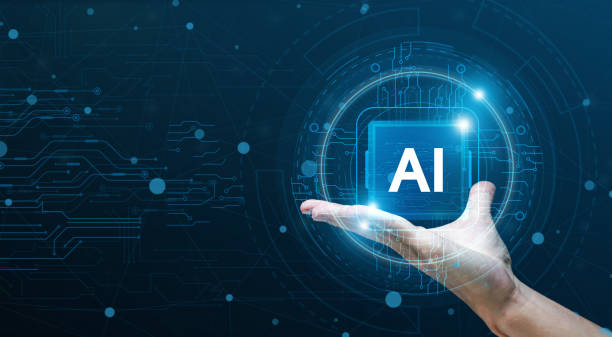
#AI Robots have great potential to transform the field of education and learning.
These robots can help students learn new concepts, develop skills, and improve academic performance.
Some of the applications of AI robots in education and learning include:
- Personalized Education: AI robots can provide personalized education by analyzing data related to students, such as their knowledge level, learning style, and interests.
These robots can adjust the educational content to suit each student. - Virtual Private Tutor: AI robots can act as virtual private tutors for students.
These robots can answer students’ questions, review their assignments, and provide feedback. - Educational Games: AI robots can create engaging and interactive educational games that help students learn new concepts.
These games can encourage students to actively participate in the learning process. - Assessment and Feedback: AI robots can assess student performance and provide accurate and immediate feedback.
These robots can identify students’ strengths and weaknesses and help them improve their performance. - Access to Education: AI robots can provide access to education for individuals who do not have access to education for various reasons (such as distance from educational centers or disability).
AI robots can help improve the quality of education and learning and provide new opportunities for students.
However, it is necessary to use this technology responsibly and ethically and avoid completely replacing human teachers with robots.
The Role of Artificial Intelligence Robots in the Manufacturing Industry and Automation

The manufacturing industry has always been looking for ways to increase productivity, reduce costs, and improve product quality.
#AI Robots, as an emerging technology, have great potential to transform this industry.
AI robots, using artificial intelligence and machine learning capabilities, can automate complex and repetitive tasks and help improve the overall performance of production lines.
Applications of #AI_Robots in the Manufacturing Industry
- Automation of Production Processes: AI robots can automate production processes completely or partially.
This leads to increased production speed, reduced human errors, and improved product quality. - Quality Inspection: AI robots equipped with advanced cameras and sensors can accurately inspect parts and products and identify defects.
This helps to reduce waste and improve the final quality of products. - Maintenance and Repair: AI robots can automatically maintain and repair equipment and machinery.
This helps to reduce downtime on production lines and increase the lifespan of equipment. - Supply Chain Management: AI robots can intelligently manage the supply chain and help optimize the flow of materials and information.
- Product Customization: AI robots can customize products based on the specific needs of customers.
This helps to increase customer satisfaction and improve the competitiveness of companies.
AI robots, by providing intelligent and efficient solutions, can help the manufacturing industry achieve its goals and create a brighter future for this industry.
Ethical Considerations in the Use of Artificial Intelligence Robots
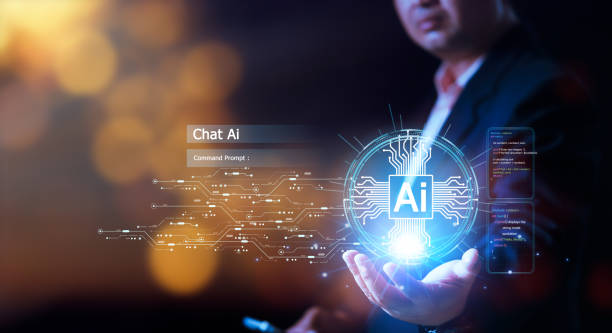
The development and use of #AI Robots comes with important ethical considerations that must be addressed.
With the advancement of technology and the increasing capabilities of these robots, concerns have been raised about their impact on society, employment, privacy, and security.
The Most Important Ethical Considerations in the Use of AI Robots
- Employment: One of the main concerns about AI robots is their impact on employment.
Automation of processes and the replacement of human labor with robots can lead to job losses and increased unemployment. - Privacy: AI robots equipped with various sensors and cameras can collect a lot of information about individuals.
This information can be used for various purposes, but its misuse can lead to a violation of individuals’ privacy. - Accountability: If an AI robot causes damage, it is difficult to determine who is responsible.
Is the robot’s manufacturer, its owner, or the robot itself responsible? These questions still do not have definitive answers. - Discrimination: Artificial intelligence algorithms may make discriminatory decisions based on their training data.
This can lead to inequality and injustice in society. - Control: With the increasing capabilities of AI robots, concerns have been raised about their control.
Is it possible for these robots to get out of control and become a threat to humans?
| Ethical Issue | Description |
|---|---|
| Job Loss | Robots can take over jobs, especially in routine and repetitive tasks |
| Privacy | Robots enable the collection of large amounts of data that threaten privacy |
| Responsibility | Who is accountable if a robot makes a mistake? |
To address these challenges, it is necessary to develop appropriate laws and regulations for the use of AI robots and provide the necessary training to individuals on how to use this technology responsibly.
Also, attention should be paid to the development of ethical and reliable algorithms.
Do you have an online store but your sales are not as expected? Rasaweb solves your problem forever with professional online store designs!
✅ Significant increase in conversion rate and sales
✅ Unparalleled user experience for your customers
⚡ Click to get a free consultation with Rasaweb!
Artificial Intelligence Robots in the Home and Everyday Life
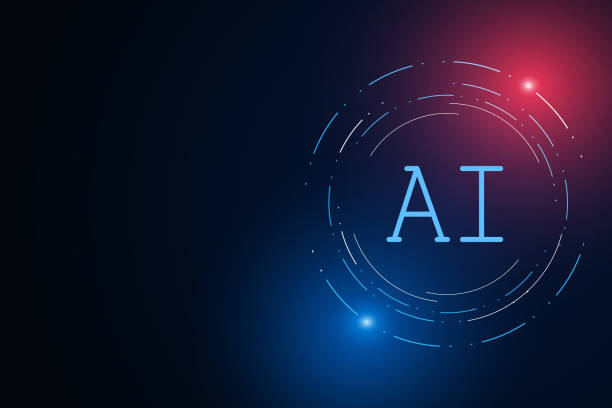
#AI Robots are gradually entering our homes and affecting our daily lives.
These robots, using artificial intelligence capabilities, can perform various tasks at home and help us better manage our lives.
Applications of AI Robots in the Home
- Cleaning: Robotic vacuum cleaners and floor cleaning robots can automatically clean the house.
These robots, using sensors and artificial intelligence algorithms, can detect obstacles and intelligently adjust their path. - Gardening: Gardening robots can mow lawns, water plants, and remove weeds.
- Security: Security robots can protect the house against theft and accidents.
These robots are equipped with various cameras and sensors and notify the homeowner if they detect a threat. - Entertainment: Entertainment robots can play with children, play music, and tell stories.
- Assistance to the Elderly and Disabled: AI robots can assist the elderly and disabled in performing daily tasks, such as eating, dressing, and moving.
AI robots can make our everyday lives easier and more comfortable.
With the advancement of technology and reduced costs, it is expected that the use of these robots will expand in homes.
How to Choose an Artificial Intelligence Robot
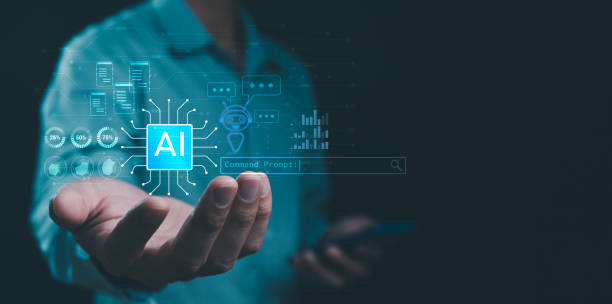
Choosing the right #AI Robot requires a careful examination of needs and consideration of various factors.
Given the wide variety available in the market, making the right choice can be challenging.
In this section, we will examine the key steps in choosing an AI robot.
- Determine Needs: First of all, you must accurately specify your needs.
What tasks do you want to assign to the robot? What expectations do you have for its performance? Answering these questions will help you narrow down your options. - Research and Review: After determining your needs, research and review different models of AI robots.
Compare technical specifications, capabilities, user reviews, and prices. - Consider Budget: The budget you have allocated for purchasing the robot plays an important role in your choice.
Try to choose a robot that is compatible with your budget and also meets your needs. - Check Compatibility: Make sure that the selected robot is compatible with the systems and devices in your home or workplace.
- Test and Evaluate: If possible, test and evaluate the robot before purchasing it.
This will help you ensure its performance and efficiency.
By considering these points and conducting the necessary research, you can choose the right AI robot and enjoy its benefits in your daily life.
Frequently Asked Questions
| Question | Answer |
|---|---|
| What is an Artificial Intelligence Robot? | An Artificial Intelligence Robot (AI Robot) is a machine capable of understanding the environment, reasoning, learning, and making decisions to perform tasks independently. |
| What is the difference between ordinary robots and artificial intelligence robots? | Ordinary robots perform repetitive tasks based on pre-programming, while artificial intelligence robots can learn from experience, interact dynamically with the environment, and even behave in a way that resembles human intelligence. |
| What are the main applications of artificial intelligence robots? | They are used in industries (manufacturing, assembly), medicine (surgery, diagnosis), services (customer support, domestic), exploration (space, underwater), and many other fields. |
| What technologies are used in building artificial intelligence robots? | Machine Learning, Computer Vision, Natural Language Processing, Deep Learning, and Robotics are among the key technologies. |
| Can artificial intelligence robots have emotions? | Currently, robots do not have emotions in the human sense. They can identify and respond to emotions, but they do not experience emotions themselves. |
| What are the main challenges in developing artificial intelligence robots? | Safety, reliability, ethics, autonomy, adaptation to complex environments, and natural interaction with humans are important challenges. |
| How do artificial intelligence robots get trained? | They are usually trained using large volumes of data, machine learning algorithms, and deep learning to identify patterns and make decisions. |
| Examples of artificial intelligence robots in everyday life? | Smart robotic vacuum cleaners, customer support chatbots, self-driving cars, and surgical robots in hospitals. |
| Are artificial intelligence robots a threat to human jobs? | Some repetitive jobs may be automated, but at the same time, robots can increase productivity and create new jobs in the development, maintenance, and monitoring of these systems. |
| How is the future of artificial intelligence robots predicted? | They are expected to become smarter, more autonomous, and capable of performing more complex tasks, and to interact more closely with humans in various environments. |
And other services of Rasa Web Advertising Agency in the field of advertising
Intelligent Linking: A creative platform to improve customer acquisition by optimizing key pages.
Intelligent Marketing Automation: Professional optimization for online growth using Google Ads management.
Intelligent Digital Advertising: Designed for businesses looking to increase website visits by customizing the user experience.
Intelligent Advertising Campaign: A dedicated service for growing user engagement based on user experience customization.
Intelligent SEO: An effective tool for user engagement by designing an attractive user interface.
And more than hundreds of other services in the field of internet advertising, advertising consulting, and organizational solutions
Internet Advertising | Advertising Strategy | Advertorial Report
Resources
Smart Robot and Its Role in the Future Life
,Advantages and Disadvantages of Artificial Intelligence Robots
,Smart Robots
,What are Smart Robots and How Do They Work?
? With Rasa Web Marketing Agency, your business reaches its peak in the online world! We create a powerful presence for you by providing innovative SEO solutions, professional social media management, and multilingual website design.
📍 Tehran, Mirdamad Street, next to the Central Bank, South Kazerun Alley, Ramin Alley No. 6

